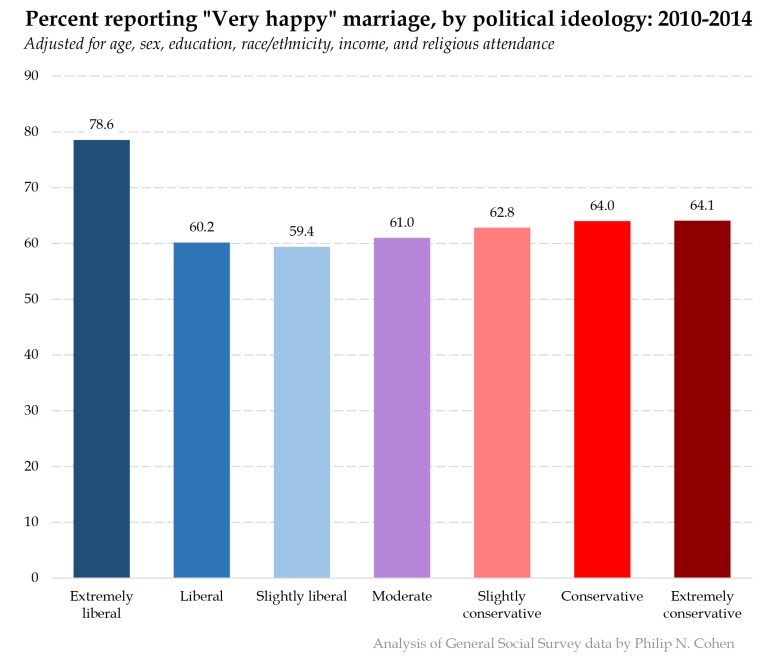On Vice’s Munchies channel (who knew), Hillary Pollack links to an excruciating Fox News chat about how Republicans have happier marriages, which I wrote about the other day.
The Fox intro says, “According to a new study, Republicans are far happier, and more stable, than Democrats are.” (Then they inaccurately described the data as being about how “married couples who describe themselves…”, when the data are about individual spouses, not couples.)
I already showed the premise isn’t true, at least as far as expressed happiness in marriage. The two groups with the highest reported marriage happiness, with demographic controls, are strong Democrats and strong Republicans, and the difference between them isn’t statistically significant.
So we can take Brad Wilcox’s words of wisdom on the meaning of Republican marital bliss in that light — that is, not.
But there is another problem here, which is he is conflating party identification with political ideology. As when he tweeted this:
“Republican” is not the same as “conservative.” In fact, the General Social Survey — the data we’re using here — has a question on political ideology as well as party identification. (Thanks to Omar Lizardo for reminding me of this.) They ask whether you “think of yourself as liberal or conservative.” And 15% of people identifying as Democrats consider themselves conservative (Republicans are much more consistently conservative).
If you’re going to claim that “conservatives have happier marriages,” you should use the political views question.* And that is even worse for this theory than the party identification (which I’m sure has nothing to do with why Wilcox chose to use the variable he did). Here is my result from the other day, using political views instead**:
So, what was that about conservatives having happier marriages?
Extreme liberals are a small group, just 3% of the this GSS sample (compared with “strong Democrats, who are 12%). But that difference is big enough to be statistically significant, with control variables, from each of the other groups (at p<.05, except the extreme conservatives, p<.10, in two-tailed tests).
David Leonhardt and other journalists covering “reports” from Brad Wilcox should consider the merits of peer review or, absent that, checking around a little before serving up this bologna. I understand there isn’t time for our peer review system to vet every little partisan claim, and I’ve served up some non-peer-reviewed reports to the news media, too. I would always encourage journalists to at least check around before running with a splashy claim.
Notes:
* This doesn’t mean ideology is always a better measure, of course. For example, when it comes to attitudes toward health care spending, this paper by Stephen Morgan and Minhyoung Kang shows that party identification is a strong predictor even controlling for ideology. But in this case the issue is conservative values, not some partisan policy matter.
** Use the code I posted the other day, but with POLVIEWS instead of PARTYID





There must be something about listening to Donald Trump that brings people together…
LikeLike
Socially conservative culture has a lot of bad recipes for bad marriages- knowing nothing about sex (except possibly from porn) before marrying. Having the general attitude that sex is about procreation, female submission/duty and other not-fun things. Marrying someone because of an unplanned pregnancy. Marrying before you’re ready because you aren’t supposed to have sex or move in together. Marrying young before you’ve really had the chance to figure out who you are as an adult. Marrying as a closet case. Having a history of sexual/emotional abuse that you’ve never gotten help with because your culture denies & victim blames.
LikeLike
If ideologues (of any stripe) are going to use social science to back their claims, they better have it right. Bravo to you for going back to the data to see what’s really there.
LikeLiked by 1 person
I have a question unrelated to the problem in hand; why do use Stata that costs more than 1000 $ per licence, and not Open Source software like R? I want to use your code, but am hampered by lack of any knowledge of Stata. I was under the impression that the days of Stata or over.
LikeLike
Good question. Sorry, but i don’t know how to use R yet.
LikeLike
Hi, I was just wondering what your chart looking at the lib-con. spectrum with applied controls would look like if you didn’t control for religious attendance? I ask this because as you say the extremely liberal are already a pretty small % of the sample, and I would assume those who attend religious services are an even smaller portion. And also because atheists/agnostics tend to lean liberal
LikeLike
Reblogged this on Project ENGAGE.
LikeLike